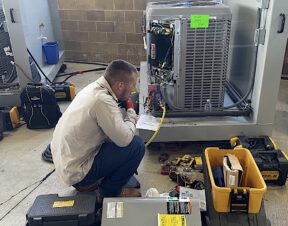On April 17, 2013, Plumbing-Heating-Cooling Contractors—National Association (PHCC) Vice President Kevin Tindall, owner of Tindall & Ranson Plumbing and Heating of Princeton, N.J., was one of three small business owners who testified on Capitol Hill about how the implementation of the nation’s Affordable Care Act (ACA) is affecting small businesses.
The purpose of the hearing was for Members of the House Small Business Committee (as well as all Members of Congress) to hear from small business owners directly, in an effort to understand what small business owners are beginning to experience with the new law. Because health care reform is extremely complicated, Congress is becoming increasingly concerned that confusion amongst small business owners will cause a situation that harms an already weakened economy.
In both his written and oral testimony, Tindall referred to himself a “small business job creator,” but pointed out that “the continued rise in the cost of providing health care insurance absolutely stifles my ability to create, provide and sustain jobs.”
He continued: “I have yet to understand how we as a nation can continue to state that we need to create more jobs, yet challenge, threaten, or even ignore the very mechanisms for job creation.”
According to Tindall, many small businesses, including his own, do not qualify for the tax credit incentives provided by the ACA because the salaries they pay their employees often exceed the $50,000 per year threshold. He also said that small businesses simply cannot continue to absorb the steep insurance premium costs that continue to rise every year. At his own company, Tindall paid 9.7 percent more to renew health care insurance in 2011, followed by an increase of 9.3 percent in 2012.
In response to a question from Rep. Chris Collins (R-NY), Tindall was able to further describe the many uncertainties the Affordable Care Act is creating for small businesses. “We’re not being able to predict the cost of going forward,” Tindall said. “The implementation of the law was supposed to create a cost-controlling mechanism, but as a company, I haven’t seen that yet. … The biggest problem I have is that it is unpredictable.”




Join the conversation: